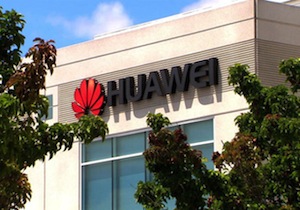U.K. to probe Huawei, BT relationship over security concerns

The relationship between embattled Chinese telecoms equipment maker Huawei, and the U.K.'s largest telecoms company British Telecom (BT) will be investigated by the U.K. Parliament's intelligence and security committee.
Sir Malcolm Rifkind, the parliamentary committee's chairman, confirmed that the companies' relationships will be examined by the panel, The Guardian confirmed earlier today, following earlier reports that the U.K. Parliament could investigate the firm in a similar style to a U.S. House probe.
According to the London newspaper, the committee is "reviewing the whole presence of Huawei in regard to our critical national infrastructure and whether that should give rise for concern," which could slow-down or even halt some ongoing broadband and mobile infrastructure projects should valid security fears regarding Huawei's equipment or company prove accurate.
Rifkind said there were allegations that the Chinese company was linked to the People's Liberation Army, the military faction of the Chinese government, and that "any Chinese company is ultimately subject to the Chinese government."
He added that the committee will look at the historical background to the contract between Huawei and BT and if there were security concerns at the time, and whether there are any further "causes for concern" since the Chinese telecoms maker became involved in the U.K.'s telecoms infrastructure.
But as Huawei is a major supplier of equipment to BT -- notably the rollout of the national fiber broadband, along with the new 4G LTE network offered by new cell network EE, among other clients -- the implications for the British market could be crucial.
Huawei, which has operated in the U.K. since the turn of the millennium, has not yet been asked to give evidence, but said it "welcome[s] all discussions and questions."
For now, the U.K. is one of the only countries still keen to saddle up to the Chinese firm. Most consumers may not even realize that the bulk of the technology used to power the British Internet is supplied from Huawei.
The Chinese firm's chief executive Ren Zhengfei recently met British Prime Minister David Cameron after pledging to invest $2 billion (£1.3bn) in the U.K. economy. Any negative response from the parliamentary committee could be embarrassing for Downing Street and the coalition government.
Cameron said at the time: "The British Government values the important relationship with China, both countries have much to offer each other and the business environment we are creating in the U.K. allows us to maximize this potential."
However, Huawei continues to face extreme criticism in the U.S. following a probe by the U.S. House Intelligence Committee that concluded earlier this week. Lawmakers said in a 52-page report that Huawei, along with ZTE -- which also makes telecoms equipment for Western countries -- that the technology giants may pose a threat to U.S. national security, and discouraged American firms from buying their equipment.
Canada recently hinted that it may also soon pull the plug on any contracts that exist with Huawei over fears that the technology may contain security risks for the country's infrastructure.
Huawei was also barred from bidding on contracts for the Australian National Broadband Network over fears that the telecoms maker's devices could include backdoors that could open the door to foreign espionage.
Huawei dismissed the claims, saying:
...we have never damaged any nation or had the intent to steal any national intelligence, enterprise secrets, or breach personal privacy and we will never support or tolerate such activities, nor will we support any entity from any country who may wish us to undertake an activity that would be deemed illegal in any country
The U.K. government, taking an entirely different approach, said that such fears could be addressed by working closly with Huawei and examining its equipment.
The Chinese firm set up a base in Banbury, Oxfordshire, in 2010 where Huawei's products can be tested and examined for threats and security vulnerabilities in conjunction with the U.K.'s security services. The so-called Cyber Security Evaluation Centre allows for the vetting of telecoms equipment to ensure that only secure products can be used in the country's critical national infrastructure.
However, there have been no public reports that there is yet anything to worry about, or equipment has failed strict vetting procedures set out by the security services and private industry telecoms groups, such as BT.
Representatives for Huawei were unavailable for comment at the time of writing. Questions have been put in to Downing Street, but we did not hear back at the time of publication. We'll update the piece if we hear back.
